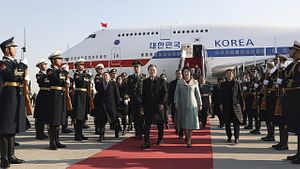South Korean President Moon Jae-in kicked off his four-day state visit in Beijing on December 13. It was his first visit to China since he took office.
With relations between Beijing and Seoul significantly strained over the deployment of the Terminal High Altitude Area Defense (THAAD) in South Korea earlier this year, Moon’s visit has been regarded by global analysts as “fence-mending trip.”
On December 14, Chinese President Xi Jinping held a welcome ceremony for Moon before their talks at the Great Hall of the People in Beijing.
According to China’s state news agency, Xinhua, during their talks, both leaders agreed to “advance bilateral relations to ensure long-term stability.”
Noting that there have been some “twists and turns” between the two countries, Xi said that these developments have “provided enlightenment for both sides on how to create a better future together on the basis of mutual respect for each other’s core interests.”
Xi also urged the two sides to “strengthen political communication, cement the foundation of mutual trust, and make good use of the exchange mechanism.”
Moon called for a “new start” in the bilateral relations, according to CGTN. Interestingly, this specific wording was intentionally omitted in Xinhua’s coverage.
The North Korean issue appeared to be the top priority for this meeting from the South Korean perspective. The Blue House emphasized in its statement that both sides reaffirmed that all issues “will be peacefully resolved through dialogue and negotiations” while “war on the Korean Peninsula can never be tolerated.”
As for the sensitive THAAD issue, the separate statements issued by the two countries signaled that two leaders still have different opinions. According to Xinhua, Xi reaffirmed China’s position on the THAAD issue and hoped South Korea “will properly deal with the issue.”
As The Diplomat has been following, China and South Korea issued a joint statement on October 31. In the statement, China claimed that Seoul had agreed not to deploy any more THAAD batteries, not to join the U.S. missile defense system in Asia, and not to engage in trilateral military cooperation with the United States and Japan. This “consensus” has become China’s precondition to be willing to resume talks with South Korea.
However, it seems that South Korea did not fully acknowledge the “consensus” claimed by Beijing. Instead, Seoul believes that it was a “consultation” rather than a “consensus.”
The Blue House said in its latest statement:
President Moon took note of the results of a bilateral consultation on October 31 regarding how to improve Korea-China ties. He underscored the importance of normalizing and advancing bilateral relations as soon as possible on the basis of mutual respect for any overriding concern of the other.
Besides the differences on the THAAD issue, another unpleasant incident took place during Moon’s visit.
Two Korean journalists were severely beaten by more than a dozen Chinese guards while attempting to cover one of Moon’s events in Beijing. Seoul has reportedly demanded a formal apology from Beijing.
In response, at the regular press briefing, Chinese Foreign Ministry spokesperson Lu Kang noted that this specific event had been “organized by the South Korean side.”
“Although it was organized by South Korea, [the incident] took place in China, so we are affording it major attention,” he added.“Hopefully, this will be a minor incident.”
Yet Chinese foreign ministry deleted Lu’s comments in the transcript of the press briefing, perhaps in an attempt to make the “minor incident” even more minor.

































